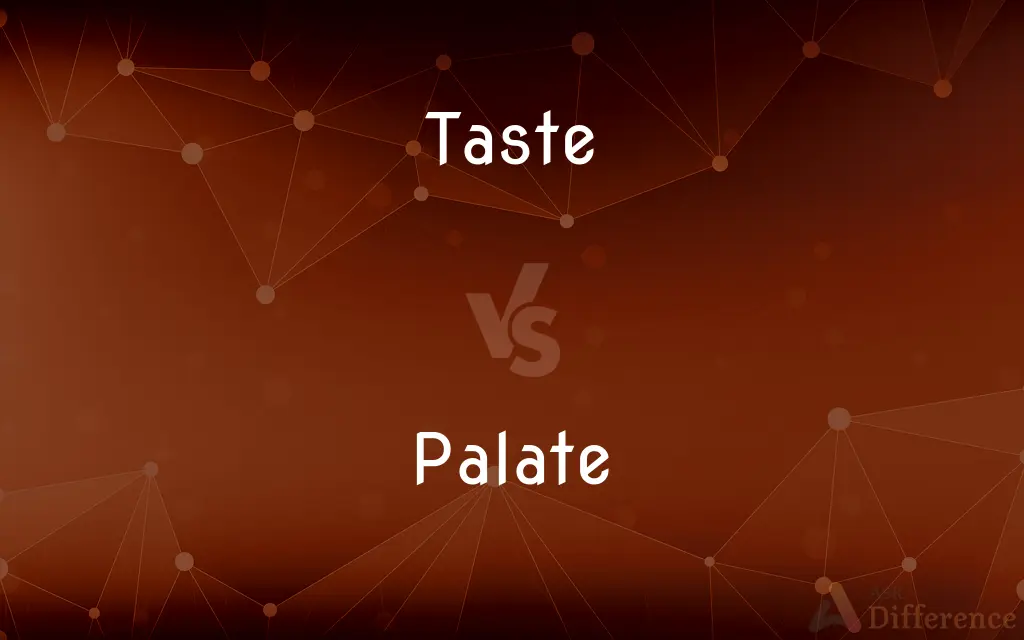Taste vs. Palate — What's the Difference?
By Tayyaba Rehman — Updated on November 6, 2023
Taste refers to the sensation produced when food contacts the tongue's taste buds, while palate refers to one’s ability to distinguish flavors.

Difference Between Taste and Palate
Table of Contents
ADVERTISEMENT
Key Differences
Taste is a sensory experience directly linked to the taste buds on the tongue, distinguishing sweetness, sourness, bitterness, saltiness, and umami. Palate, however, often refers to an individual's appreciation for and ability to discern between different flavors, which can be refined over time.
While taste is a universal physiological capability, the palate is subjective and varies greatly from person to person, influenced by culture, experience, and genetic makeup. Taste sensations are immediate and biological, while the palate is developed through exposure and mindfulness to different flavors and textures.
The term taste can also extend to a metaphorical sense, implying preference or inclination in general, such as in art or fashion. Conversely, the palate is almost exclusively used in the context of food and drink, relating to gastronomic sophistication and preferences.
In discussing food and beverages, taste is often considered the simpler act of sensing flavors, whereas referring to the palate can imply a more sophisticated process of taste analysis and the overall enjoyment of a meal. The palate can recognize the balance and complexity within a dish or a drink.
Every person's taste is genetically determined and can change with age or due to health issues, leading to variations in sensitivity to the basic tastes. The palate, however, is educated and can evolve, becoming more attuned to nuanced flavors and the artistry involved in culinary creations.
ADVERTISEMENT
Comparison Chart
Definition
Sensation of flavor on the tongue.
Range of discernible flavors.
Context
Biological sense.
Gastronomic sophistication.
Usage
Universal sensory experience.
Individual flavor appreciation.
Variation
Genetic and changeable.
Refined through experience.
Scope
Basic sensory process.
Includes complexity of flavors.
Compare with Definitions
Taste
A sensation from the tongue’s taste buds.
The bitter taste of the medicine made me grimace.
Palate
A term signifying a level of culinary sophistication.
Wine connoisseurs are known for their refined palates.
Taste
Personal preference or inclination.
She has a taste for fine art.
Palate
The roof of the mouth separating oral and nasal cavities.
The hot pizza burned my palate.
Taste
Experiencing or trying out.
I got a taste of skydiving during my vacation.
Palate
One’s ability to taste and enjoy complex flavors.
A chef’s palate is his most valuable asset.
Taste
The ability to judge or criticize.
Her taste in music is impeccable.
Palate
The range of flavors a person can enjoy and appreciate.
Her well-traveled palate appreciates diverse cuisines.
Taste
The gustatory system or sense of taste is the sensory system that is partially responsible for the perception of taste (flavor). Taste is the perception produced or stimulated when a substance in the mouth reacts chemically with taste receptor cells located on taste buds in the oral cavity, mostly on the tongue.
Palate
A metaphor for aesthetic preference.
His architectural designs cater to a modern palate.
Taste
The sensation of flavour perceived in the mouth and throat on contact with a substance
The wine had a fruity taste
Palate
The palate is the roof of the mouth in humans and other mammals. It separates the oral cavity from the nasal cavity.
Taste
A person's liking for particular flavours
This pudding is too sweet for my taste
Palate
The roof of the mouth, separating the cavities of the mouth and nose in vertebrates.
Taste
The ability to discern what is of good quality or of a high aesthetic standard
She has frightful taste in literature
Palate
A person's ability to distinguish between and appreciate different flavours
A fine range of drink for sophisticated palates
The suggestions may not suit everyone's palate
Taste
Perceive or experience the flavour of
She had never tasted ice cream before
Palate
The roof of the mouth in vertebrates having a complete or partial separation of the oral and nasal cavities and consisting of the hard palate and the soft palate.
Taste
Have experience of
The team has not yet tasted victory at home
Palate
(Botany) The projecting part on the lower lip of a bilabiate corolla that closes the throat, as in a snapdragon.
Taste
To distinguish the flavor of by taking into the mouth.
Palate
The sense of taste
Delicacies pleasing to the most refined palate.
Taste
To eat or drink a small quantity of.
Palate
(anatomy) The roof of the mouth, separating the cavities of the mouth and nose in vertebrates.
Taste
To partake of, especially for the first time; experience
Prisoners finally tasting freedom.
Palate
(zoology) A part associated with the mouth of certain invertebrates, somewhat analagous to the palate of vertebrates.
Taste
(Archaic) To appreciate or enjoy.
Palate
The hypopharynx of an insect.
Taste
To distinguish flavors in the mouth.
Palate
(botany) A projection in the throat of certain bilabiate flowers as the snapdragon.
Taste
To have a distinct flavor
The stew tastes salty.
Palate
The palate of an animal, as an item of food.
Taste
To eat or drink a small amount.
Palate
(figuratively) A person's ability to distinguish between and appreciate different flavors.
Taste
To have experience or enjoyment; partake
Tasted of the life of the very rich.
Palate
(figuratively) Mental relish; a liking or affinity for something.
Taste
The sense that distinguishes the sweet, sour, salty, and bitter qualities of dissolved substances in contact with the taste buds on the tongue.
Palate
Taste or flavour, especially with reference to wine or other alcoholic drinks.
Taste
This sense in combination with the senses of smell and touch, which together receive a sensation of a substance in the mouth.
Palate
To relish; to find palatable.
Taste
The sensation of sweet, sour, salty, or bitter qualities produced by a substance placed in the mouth.
Palate
The roof of the mouth.
Taste
The unified sensation produced by any of these qualities plus a distinct smell and texture; flavor.
Palate
Relish; taste; liking; - a sense originating in the mistaken notion that the palate is the organ of taste.
Hard task! to hit the palate of such guests.
Taste
A distinctive perception as if by the sense of taste
An experience that left a bad taste in my mouth.
Palate
Mental relish; intellectual taste.
Taste
The act of tasting.
Palate
A projection in the throat of such flowers as the snapdragon.
Taste
A small quantity eaten or tasted.
Palate
To perceive by the taste.
Taste
A limited or first experience; a sample
"Thousands entered the war, got just a taste of it, and then stepped out" (Mark Twain).
Palate
The upper surface of the mouth that separates the oral and nasal cavities
Taste
A personal preference or liking
A taste for adventure.
A play that was not to my taste.
Taste
The ability to recognize and appreciate what is beautiful, excellent, or appropriate
Has good taste in clothes.
Taste
The sense of what is proper, seemly, or least likely to give offense in a given social situation
A remark made in bad taste.
Taste
(Obsolete) The act of testing; trial.
Taste
One of the sensations produced by the tongue in response to certain chemicals; the quality of giving this sensation.
He had a strange taste in his mouth.
Venison has a strong taste.
Taste
The sense that consists in the perception and interpretation of this sensation.
His taste was impaired by an illness.
Taste
A small sample of food, drink, or recreational drugs.
Taste
A person's implicit set of preferences, especially esthetic, though also culinary, sartorial, etc.
Dr. Parker has good taste in wine.
Taste
Personal preference; liking; predilection.
I have developed a taste for fine wine.
Taste
A small amount of experience with something that gives a sense of its quality as a whole.
Such anecdotes give one a taste of life on a trauma ward.
Taste
A kind of narrow and thin silk ribbon.
Taste
(transitive) To sample the flavor of something orally.
Taste
To have a taste; to excite a particular sensation by which flavor is distinguished.
The chicken tasted great, but the milk tasted like garlic.
Taste
(transitive) To identify (a flavor) by sampling something orally.
I can definitely taste the marzipan in this cake.
Taste
To experience.
I tasted in her arms the delights of paradise.
They had not yet tasted the sweetness of freedom.
Taste
To take sparingly.
Taste
To try by eating a little; to eat a small quantity of.
Taste
(obsolete) To try by the touch; to handle.
Taste
To try by the touch; to handle; as, to taste a bow.
Taste it well and stone thou shalt it find.
Taste
To try by the touch of the tongue; to perceive the relish or flavor of (anything) by taking a small quantity into a mouth. Also used figuratively.
When the ruler of the feast had tasted the water that was made wine.
When Commodus had once tasted human blood, he became incapable of pity or remorse.
Taste
To try by eating a little; to eat a small quantity of.
I tasted a little of this honey.
Taste
To become acquainted with by actual trial; to essay; to experience; to undergo.
He . . . should taste death for every man.
Taste
To partake of; to participate in; - usually with an implied sense of relish or pleasure.
Thou . . . wilt tasteNo pleasure, though in pleasure, solitary.
Taste
To try food with the mouth; to eat or drink a little only; to try the flavor of anything; as, to taste of each kind of wine.
Taste
To have a smack; to excite a particular sensation, by which the specific quality or flavor is distinguished; to have a particular quality or character; as, this water tastes brackish; the milk tastes of garlic.
Yea, every idle, nice, and wanton reasonShall to the king taste of this action.
Taste
To take sparingly.
For age but tastes of pleasures, youth devours.
Taste
To have perception, experience, or enjoyment; to partake; as, to taste of nature's bounty.
The valiant never taste of death but once.
Taste
The act of tasting; gustation.
Taste
A particular sensation excited by the application of a substance to the tongue; the quality or savor of any substance as perceived by means of the tongue; flavor; as, the taste of an orange or an apple; a bitter taste; an acid taste; a sweet taste.
Taste
The one of the five senses by which certain properties of bodies (called their taste, savor, flavor) are ascertained by contact with the organs of taste.
Taste
Intellectual relish; liking; fondness; - formerly with of, now with for; as, he had no taste for study.
I have no tasteOf popular applause.
Taste
The power of perceiving and relishing excellence in human performances; the faculty of discerning beauty, order, congruity, proportion, symmetry, or whatever constitutes excellence, particularly in the fine arts and belles-letters; critical judgment; discernment.
Taste
Manner, with respect to what is pleasing, refined, or in accordance with good usage; style; as, music composed in good taste; an epitaph in bad taste.
Taste
Essay; trial; experience; experiment.
Taste
A small portion given as a specimen; a little piece tasted or eaten; a bit.
Taste
A kind of narrow and thin silk ribbon.
What, then, is taste, but those internal powers,Active and strong, and feelingly aliveTo each fine impulse? a discerning senseOf decent and sublime, with quick disgustFrom things deformed, or disarranged, or grossIn species? This, nor gems, nor stores of gold,Nor purple state, nor culture, can bestow,But God alone, when first his active handImprints the secret bias of the soul.
Taste
The sensation that results when taste buds in the tongue and throat convey information about the chemical composition of a soluble stimulus;
The candy left him with a bad taste
The melon had a delicious taste
Taste
A strong liking;
My own preference is for good literature
The Irish have a penchant for blarney
Taste
Delicate discrimination (especially of aesthetic values);
Arrogance and lack of taste contributed to his rapid success
To ask at that particular time was the ultimate in bad taste
Taste
A brief experience of something;
He got a taste of life on the wild side
She enjoyed her brief taste of independence
Taste
A small amount eaten or drunk;
Take a taste--you'll like it
Taste
The faculty of taste;
His cold deprived him of his sense of taste
Taste
A kind of sensing; distinguishing substances by means of the taste buds;
A wine tasting
Taste
Have flavor; taste of something
Taste
Take a sample of;
Try these new crackers
Sample the regional dishes
Taste
Perceive by the sense of taste;
Can you taste the garlic?
Taste
Have a distinctive or characteristic taste;
This tastes of nutmeg
Taste
Distinguish flavors;
We tasted wines last night
Taste
Experience briefly;
The ex-slave tasted freedom shortly before she died
Taste
Discerning or appreciating flavors.
He has a taste for spicy food.
Common Curiosities
How does a chef use their palate?
A chef uses their palate to fine-tune the flavors in their dishes.
Is the sense of taste the same as having a good palate?
No, having a good palate involves more discernment than basic taste sensations.
What is taste primarily determined by?
Taste is primarily determined by the taste buds on the tongue.
Does age affect one's palate?
Yes, as we age, our palate can change and often becomes less sensitive.
Can one's taste in food predict their palate?
To some extent, as personal tastes can indicate how developed one’s palate is.
Can the loss of taste affect one's palate?
Yes, if the sense of taste is impaired, it can affect the palate.
Does having a 'broad palate' mean liking everything?
Not necessarily; it means appreciating a wide range of flavors.
Can illness change one's taste and palate?
Yes, certain illnesses can alter taste and diminish the palate.
Can everyone develop a sophisticated palate?
Yes, with exposure and practice, most people can refine their palate.
Is the palate only about food?
While typically about food, it can metaphorically extend to other aesthetic areas.
How do you train your palate?
By trying new foods and flavors and paying attention to the tasting experience.
What part of the brain is involved in taste?
The gustatory cortex is primarily involved in the perception of taste.
Are taste buds the only factor in taste?
No, smell and other factors also play a significant role in the perception of taste.
Does cooking at high heat affect the taste and palate?
It can, as it changes the chemical structure of food, thus altering flavor profiles.
Is taste subjective or objective?
Taste is a subjective experience, as it varies from person to person.
Share Your Discovery

Previous Comparison
Jaguarundi vs. Jaguar
Next Comparison
Synonym vs. IdiomAuthor Spotlight
Written by
Tayyaba RehmanTayyaba Rehman is a distinguished writer, currently serving as a primary contributor to askdifference.com. As a researcher in semantics and etymology, Tayyaba's passion for the complexity of languages and their distinctions has found a perfect home on the platform. Tayyaba delves into the intricacies of language, distinguishing between commonly confused words and phrases, thereby providing clarity for readers worldwide.















































